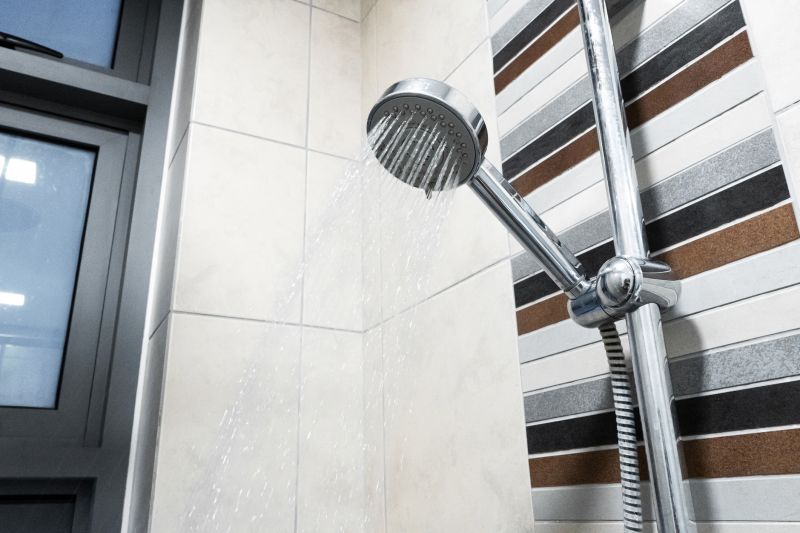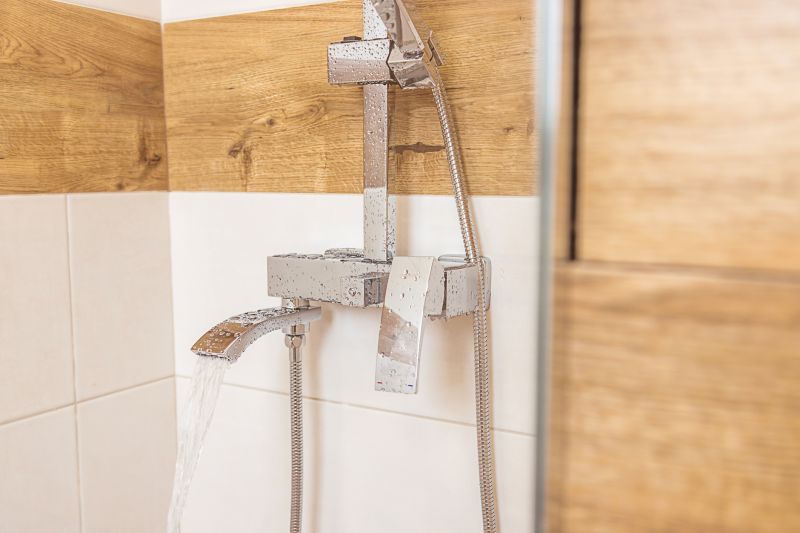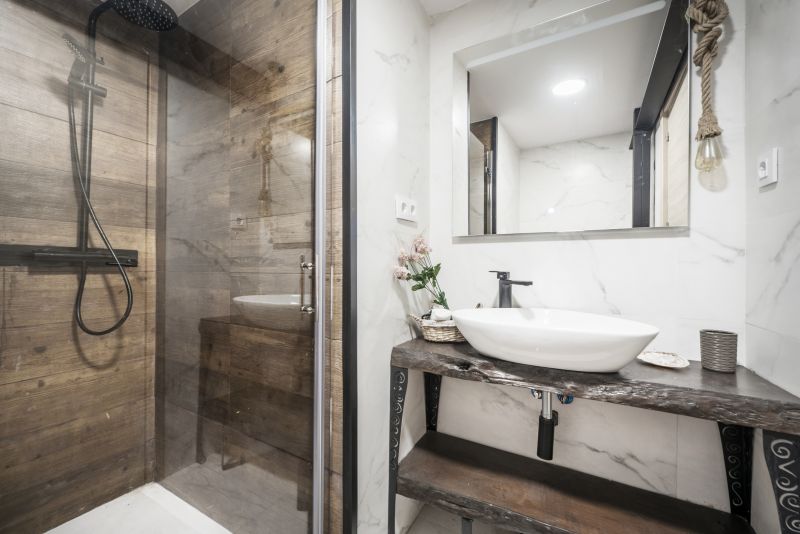Shower Fixture Compatibility
Welcome to Aberdeen Showers
Shop for Shower Fixture Compatibility

When considering an upgrade or replacement of shower fixtures, homeowners face the challenge of ensuring compatibility with their existing plumbing and bathroom design. Shower fixture compatibility involves understanding the nuances of different fixture types, plumbing requirements, and aesthetic considerations that align with your home's style and functional needs.
One of the primary considerations is the type of shower valve already installed in your bathroom. Valves are critical as they control the water temperature and flow. Common types include pressure-balancing valves, thermostatic valves, and diverter valves. Each type has its own set of requirements and benefits. For instance, pressure-balancing valves are known for maintaining consistent water temperature, which is crucial for safety, especially in households with children or elderly members.
Another consideration is the showerhead type. Options range from fixed showerheads to handheld models, and even rain showerheads. Fixed showerheads are straightforward and typically easier to install, while handheld models offer flexibility and convenience, especially for families. Rain showerheads provide a luxurious experience, mimicking the feel of natural rainfall, but may require additional plumbing adjustments to accommodate their size and water flow needs.
Compatibility is also influenced by the water pressure in your home. Homes in Aberdeen, North Carolina, typically experience moderate water pressure, which suits most standard showerheads. However, if you opt for high-flow models, you may need to assess whether your plumbing can handle the increased demand without compromising performance.
Material choice is another key factor. Fixtures are available in various materials such as chrome, stainless steel, brass, and plastic. Chrome and stainless steel offer durability and a modern look, while brass provides a classic touch. Plastic fixtures are often more budget-friendly but may not offer the same longevity. The choice of material can also affect compatibility with existing bathroom décor and fixtures.
Homeowners should also consider the style and finish of the fixtures. Matching the style of new fixtures with existing ones can create a cohesive look. Popular finishes include brushed nickel, polished chrome, and oil-rubbed bronze, each offering a distinct aesthetic. While brushed nickel is versatile and resists water spots, polished chrome is known for its reflective shine, and oil-rubbed bronze adds a rustic charm.
To help homeowners make informed decisions, here is a comparison of common shower fixture options:
| Option | Pros | Cons |
|---|---|---|
| Pressure-Balancing Valve | Maintains consistent temperature | Limited control over water flow |
| Thermostatic Valve | Precise temperature control | Higher cost |
| Fixed Showerhead | Easy installation | Less flexibility |
| Handheld Showerhead | Versatile and convenient | Requires more maintenance |
Where it fits:
- Pressure-Balancing Valve: Ideal for family bathrooms
- Thermostatic Valve: Suitable for luxury or master bathrooms
- Fixed Showerhead: Best for guest bathrooms
- Handheld Showerhead: Great for family or accessible bathrooms
Understanding these factors and how they align with your home's needs can help you choose the right fixtures, ensuring a harmonious balance between functionality and style in your bathroom space.
Comparing Common Shower Fixture Materials
Shop for Comparing Common Shower Fixture
A Comparison of Brass, Stainless Steel, and Plastic Shower Fixtures
When renovating or designing a bathroom, selecting the right shower fixture material is crucial for both aesthetics and functionality. Homeowners in Aberdeen, North Carolina, and beyond often consider factors such as durability, cost, and maintenance when choosing between brass, stainless steel, and plastic fixtures. Each material offers unique benefits and potential drawbacks, making it essential to understand their characteristics before making a decision.
Brass shower fixtures are well-known for their durability and classic appearance. This material is resistant to rust and corrosion, making it an excellent choice for humid environments like bathrooms. Brass fixtures often come with a polished finish that adds a touch of elegance to any bathroom setting. However, they can be more expensive than other options, and their weight may require more robust plumbing support. Additionally, brass fixtures may require regular cleaning to maintain their shine.

Stainless steel fixtures are another popular choice due to their modern look and resilience. They are resistant to rust and stains, making them a practical option for long-term use. Stainless steel is also relatively easy to clean and maintain, which can be a significant advantage for busy homeowners. On the downside, stainless steel fixtures can show water spots and fingerprints, requiring frequent wiping to keep them looking pristine. They are generally less expensive than brass but may not offer the same level of aesthetic appeal for those seeking a more traditional look.
Plastic shower fixtures are often chosen for their affordability and versatility. They come in a wide range of styles and colors, allowing homeowners to customize their bathroom's appearance easily. Plastic fixtures are lightweight and easy to install, making them a convenient choice for quick renovations. However, they may not be as durable as metal options and can be prone to cracking or discoloration over time. For homeowners on a budget or those looking for a temporary solution, plastic fixtures can be a viable option.
| Option | Pros | Cons |
|---|---|---|
| Brass | Durable, Rust-resistant, Elegant appearance | Expensive, Heavy, Requires maintenance |
| Stainless Steel | Modern look, Rust-resistant, Easy to clean | Shows water spots, Less traditional appearance |
| Plastic | Affordable, Versatile, Lightweight | Less durable, Prone to cracking, Can discolor |
When deciding on the right shower fixture material, consider the specific needs of your bathroom. Brass fixtures are ideal for those seeking a timeless and durable option, while stainless steel is perfect for a sleek and modern look. Plastic fixtures, on the other hand, are suitable for budget-conscious homeowners or temporary installations.
- Brass: Best for traditional, long-lasting installations.
- Stainless Steel: Ideal for modern, easy-to-maintain bathrooms.
- Plastic: Suitable for budget-friendly or temporary solutions.
Ultimately, the choice of shower fixture material will depend on personal preferences, budget, and the desired aesthetic of your bathroom. By carefully considering the pros and cons of each material, homeowners can make an informed decision that enhances their bathroom's functionality and style.
Exploring Shower Fixture Styles
Shop for Exploring Shower Fixture
Traditional vs. Modern Shower Fixture Styles
When selecting shower fixtures, homeowners in Aberdeen, North Carolina, often find themselves navigating a sea of options. The choice of shower fixtures can significantly influence both the functionality and aesthetics of a bathroom. Understanding the differences between traditional, contemporary, and transitional styles can help homeowners make informed decisions that align with their personal tastes and the existing decor of their homes.
Traditional shower fixtures typically feature classic designs with intricate details and ornate finishes. These fixtures often come in materials like brass or bronze, offering a timeless appeal that complements vintage or classic bathroom designs. While traditional fixtures can add a touch of elegance, they may require more maintenance to preserve their finish, especially in humid environments like bathrooms.

In contrast, modern shower fixtures are characterized by sleek, minimalist designs with clean lines and polished surfaces. Often made from stainless steel or chrome, these fixtures are designed to be functional and easy to clean. Modern styles are ideal for homeowners who prefer a contemporary look and want to create a sense of spaciousness in smaller bathrooms. However, the minimalist design may not provide the same level of visual interest as more detailed traditional fixtures.
Transitional shower fixtures offer a blend of traditional and modern elements, providing a versatile option for homeowners who appreciate elements of both styles. These fixtures often feature simple lines with subtle decorative touches, making them suitable for a variety of bathroom designs. Transitional fixtures can be a great choice for those looking to update their bathroom without committing fully to a modern or traditional aesthetic.
When considering shower fixture compatibility, it's important to ensure that the chosen style integrates well with existing plumbing and bathroom features. For instance, traditional fixtures may require specific valve types or mounting configurations that differ from modern setups. Consulting with a knowledgeable supplier or installer can help navigate these technical considerations.
Below is a comparison of the different shower fixture styles:
| Option | Pros | Cons |
|---|---|---|
| Traditional | Elegant, timeless design | Higher maintenance, may not suit modern homes |
| Modern | Sleek, easy to clean | Minimal visual interest |
| Transitional | Versatile, blends styles | May lack distinct identity |
- Traditional: Ideal for vintage or classic home designs
- Modern: Fits contemporary, minimalist spaces
- Transitional: Suitable for mixed-style decor
Ultimately, the choice of shower fixtures should reflect the homeowner's personal style and the practical needs of their bathroom space. By considering the pros and cons of each style, homeowners can select fixtures that enhance both the look and functionality of their bathrooms.



